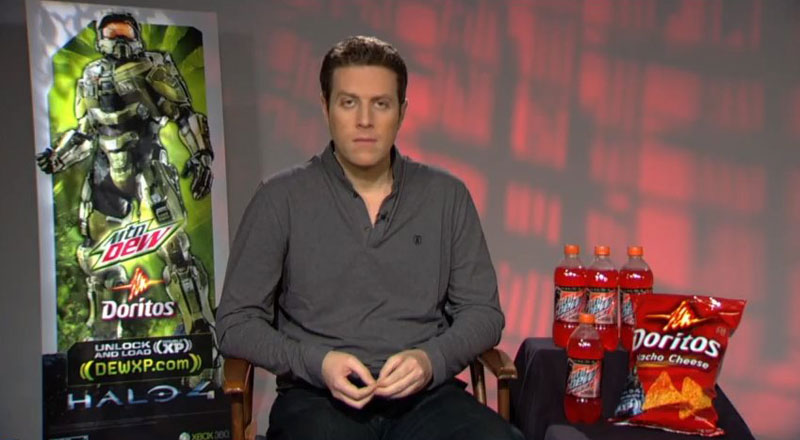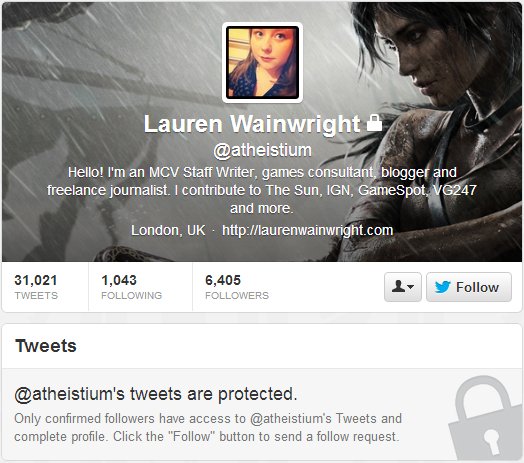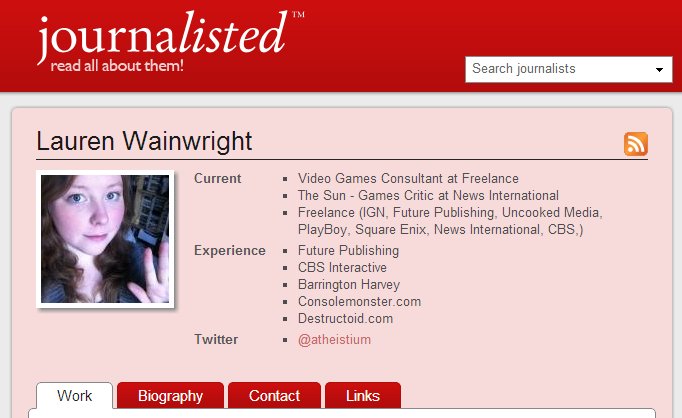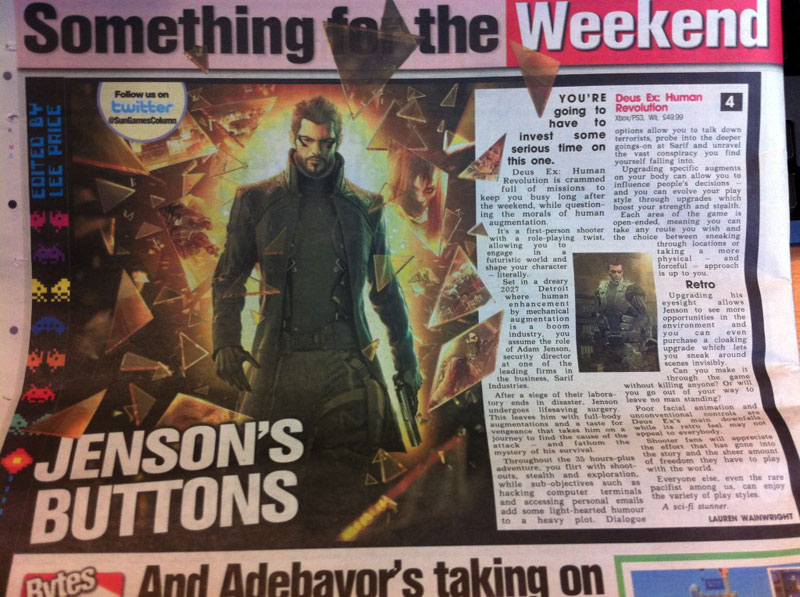One of the most common criticisms heard by members of the games media is, "They must be on the take." Having written about video games for more than a decade and a half, I've seen it countless times, usually when someone disagrees with an outlet. While there have been some noted examples of both game publishers and media outlets doing something shady, those are very much the exception rather than the rule. By and large, most people working in the games media are honest, as are those working in PR. What we all have to remember, though, is that perception is often more important than the truth.
This is a point that Rab Florence made in an article published on Eurogamer yesterday. It's a well-written opinion piece that explores how seemingly innocent actions can easily be interpreted as an act of bias by a reader. Florence kicks off the piece with a bit of commentary on a humorous screen grab showing Spike TV's Video Game Awards host Geoff Keighley sitting for an interview while surrounded by marketing materials for Halo 4 and Doritos.
That image has already become a meme about gaming fans, but it's not the core of Florence's article. For that, he uses the example of media members using a specific Twitter hashtag to promote a sponsored game during this year's Games Media Awards event in the UK. Anyone who tweeted with the hashtag #gmadefiance was entered into a drawing to win a brand-new PlayStation 3 from Defiance developer Trion. On its surface, this is pretty standard fare for Twitter. Florence even highlights that in his piece, noting that those at the event probably didn't think much of it at the time; to those on the outside, it could seem like sponsored advertising.

Florence's piece generated some discussion among members of the UK games media yesterday, but it went relatively unnoticed until one of the journalists quoted in the original piece allegedly threatened to sue for libel. Eurogamer capitulated and removed a section of the article, replacing it with the following editor's note.
"Following receipt of a complaint from Lauren Wainwright, Eurogamer has removed part of this article (but without admission of any liability). Eurogamer apologises for any distress caused to Ms Wainwright by the references to her. The article otherwise remains as originally published."
Suddenly, Florence's original point was secondary. The real news was now the fact that Lauren Wainwright was allegedly threatening legal action against another media outlet for reporting on statements she made publicly. Wainwright is currently employed as a staff writer for MCV, which is owned by Intent Media, the same company that produces the Games Media Awards.
What were the insidious words that prompted the complaint? The following text appeared in Florence's article as originally published.
"Let me show you an example.
One games journalist, Lauren Wainwright, tweeted: "Urm… Trion were giving away PS3s to journalists at the GMAs. Not sure why that's a bad thing?"
Now, a few tweets earlier, she also tweeted this: "Lara header, two TR pix in the gallery and a very subtle TR background. #obsessed @tombraider pic.twitter.com/VOWDSavZ"
And instantly I am suspicious. I am suspicious of this journalist's apparent love for Tomb Raider. I am asking myself whether she's in the pocket of the Tomb Raider PR team. I'm sure she isn't, but the doubt is there. After all, she sees nothing wrong with journalists promoting a game to win a PS3, right?
Another journalist, one of the winners of the PS3 competition, tweeted this at disgusted RPS writer John Walker: "It was a hashtag, not an advert. Get off the pedestal." Now, this was Dave Cook, a guy I've met before. A good guy, as far as I could tell. But I don't believe for one second that Dave doesn't understand that in this time of social media madness a hashtag is just as powerful as an advert. Either he's on the defensive or he doesn't get what being a journalist is actually about."
Looking at this objectively, there's nothing untoward written in the piece. Florence hasn't made up anything, nor has he accused anyone of doing anything improper. He simply uses both Wainwright and Cook as practical examples of how public statements can be perceived by the general public. Initially, neither Wainwright nor Cook were happy about being quoted, but as journalists, we all have to own our words. To his credit, Cook did just that.
Cook engaged Florence (and others) on his Twitter feed, explained his point of view as well as taking a look at the situation as others presented it. He seemed to realize how his actions could have been perceived poorly and clarified that the PS3 he won was being donated to charity. All in all, Cook comes across as an honest, level-headed guy. While I've not read any of his work before this, seeing how he handled a difficult situation with grace motivated me to look up some of his current writing.
Had Wainwright taken the same tack as Cook, the current blow-up would have never happened. Instead, she seemingly went on the offensive against Eurogamer. According to a statement made by MCV Editor in Chief Michael French via Twitter, "There was no legal action taken from Intent. We asked Eurogamer to remove cruel content about a staff member. They obliged." This quote seems to be at odds with Florence's stated position, but no one has spoken publicly about what exactly was said between the two companies. Complicating things, Wainwright classified Florence's piece as libel on her own Twitter feed, which she has now set to private.

Unfortunately, in closing off access to her Twitter feed, Wainwright made it look like she had something to hide. Remembering the axiom that "perception is reality" when it comes to the general public, this action piqued the interest of gamers across the Internet. In trying to bury her original quote, Wainwright had inadvertently subjected herself to the Streisand effect. In the end, what turned up looked much worse for Wainwright than the original quote ever could have been.
Before setting her Twitter feed to private, Wainwright originally argued that simply being a fan of Tomb Raider shouldn't be an issue. And it's not. There are plenty of journalists who have favorite franchises. Sure, using the official artwork for the upcoming game on her personal Twitter page may have raised a few questions, but it was no big deal — until someone pointed out Wainwright's page on the UK media site, Journalisted. A professional networking site, Wainwright listed freelance work for Square Enix as being one of her projects as currently as this morning.

Wainwright has since removed any mention of her paid work for Square Enix from her public profile.
Wainwright also said via Twitter that while she consulted with Square Enix, she never reviewed any of their games. Though she did not give any specifics of what she worked on for the game publisher, links to her previous work in covering the company's games quickly surfaced — including links to reviews.
Mark Brown, the deputy editor of Pocket Gamer, tweeted a link to Wainwright's Web site, where she had posted a photo of her Deus Ex: Human Revolution review, which was published by UK newspaper, The Sun.

Rev. Stuart Campbell, a Scottish game journalist, went all out, tweeting a series of links to Wainwright's past Square Enix coverage on his Twitter feed. One item of note was the fact that the Lara Croft and the Guardian of Light review Wainwright wrote for IncGamers no longer appears on their site. Instead, the current IncGamers review page for the game is completely blank.
Incidentally, all of the actions taken by Wainwright have only served as a practical illustration of Florence's original point — that as members of the media, we all have to be aware of how our actions are perceived. Instead of a simple commentary quickly fading from view, the resulting actions have now impacted the reputation of Eurogamer, MCV and Wainwright as well as tainted gamer impressions of the new Tomb Raider. Perhaps the only real winner is Trion's PR department, as the #gmadefiance hashtag is now being used by those commenting on the events, and the game name is certainly getting noticed.
On the upside, the discussion that is occurring amongst members of the gaming media and gaming fans on various forums across the Internet is a very good thing. The actions that kicked it off may not have been ideal, but there is no denying that as members of the gaming media, we should all be taking a critical look at our own actions — and how we are perceived — on a regular basis.









